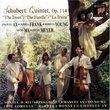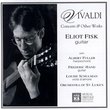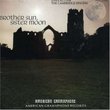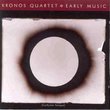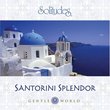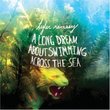| All Artists: Bartomeu Carceres, Juan del Encina, Garcimunos, Luis de Milan, Diego Ortiz, Cancionero de Palacio, Sephardic Traditional, Hesperion XX, Jordi Savall, Montserrat Figueras Title: Secular Music from Christian and Jewish Spain Members Wishing: 0 Total Copies: 0 Label: EMI Classics Release Date: 6/8/1999 Genres: Dance & Electronic, Special Interest, Pop, Classical Styles: Vocal Pop, Opera & Classical Vocal, Chamber Music, Historical Periods, Classical (c.1770-1830) Number of Discs: 2 SwapaCD Credits: 2 UPC: 724356159129 |
Search - Bartomeu Carceres, Juan del Encina, Garcimunos :: Secular Music from Christian and Jewish Spain
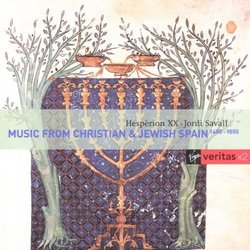 | Bartomeu Carceres, Juan del Encina, Garcimunos Secular Music from Christian and Jewish Spain Genres: Dance & Electronic, Special Interest, Pop, Classical
Before their expulsion in 1492, the Jews of medieval Spain developed a rich and lively culture, including an exquisite repertory of songs called romanceros--and they kept that repertory alive as they settled in places a... more » |
Larger Image |
CD DetailsSynopsis
Amazon.com Before their expulsion in 1492, the Jews of medieval Spain developed a rich and lively culture, including an exquisite repertory of songs called romanceros--and they kept that repertory alive as they settled in places as diverse as Morocco, Bosnia, Turkey, and Bulgaria. Lovely as the romanceros are, they would have languished as the objects of ethnomusicological studies and might have disappeared altogether, were it not for the efforts of gifted musicians like Hespèrion XX. Jordi Savall and his ensemble, fronted by the unique soprano Montserrat Figueras, just about single-handedly brought those songs to the attention of the modern public with this 1976 recording (now reissued at a bargain price). Disc 1 features a selection of secular music from "Christian" Spain--that is, the courts of Ferdinand and Isabella and the Catholic nobility. The music is elegant and occasionally austere, but Figueras, Savall, and colleagues give the livelier pieces a flavorful swing. Yet disc 2, which features the Sephardic songs, is the real drawing card here. It was in Moorish Spain that Jewish culture flourished, so Hespèrion XX performs the romanceros with Arabic instruments, such as the 'ud (the ancestor of the European lute) and hand drums. These musicians, rechristened Hespèrion XXI in honor of the new century, perform this repertory with more polish now than they did in 1976, but--just as A Feather on the Breath of God did for Hildegard von Bingen--this recording made its own little bit of musical history. --Matthew Westphal Similarly Requested CDs
|
CD ReviewsHistorical re-release 07/20/1999 (3 out of 5 stars) "Hesperion XX were pioneers in reviving this music, and collectors will value these recordings which first came out in 1976. However most listeners may prefer more recent recordings by Wimmer on Naxos, and Alia Musica on Harmonia Mundi which have digital sound and include Spanish, and occasionally Hebrew, texts and translations." A balm for any soul Stephen A. Haines | Ottawa, Ontario Canada | 01/02/2001 (5 out of 5 stars) "Attempting to review a Savall/Figueras CD is a frustrating task. The arsenal of superlatives is so quickly depleted. Terms like 'matchless' and 'unique' might be used, but lack strict definition. After all, a 'matchless' voice needn't be a good one. Terms like 'divine' or 'angelic' tend to remove Montserrat's singing from the real and human. She's nothing if not human. Having been blessed with watching as well as hearing her perform, vouching for her vitality on a stage is easy. But the superior quality of her voice and presentation is so far above the mundane or common as to become nearly indescribable. Anything less than adulation for her seems to indicate shortcomings in the disk or performer. Neither performance nor disk quality falls short here. That she performs religious songs here simply adds to the power of her impact on the listener. You necessarily hesitate, cease other activity, and, if moved enough, drop to your knees in respect and admiration. Tough to do in a crowded concert hall, but the motivation is there. And this from someone who shunned listening to vocal performances for many years. Dame Kiri was one exception and Argenta another, but the discovery of Figueras was the discovery of a voice without flaw.Anyone visiting this page must certainly know of Jordi Savall and Hesperion XX. You may, however, have missed the glory of Montserrat Figueras' voice. Make up for that lack right away. The selections available here are pitifully limited, but this CD is as good an introduction as any. Don't hesitate to sit and enjoy this music. The sounds received will be a reward to whatever spiritual sense you possess." Ten stars if possible... Jan Hupkes | Utrecht, Nederland | 01/27/2000 (5 out of 5 stars) "I agree completely with Stephan: outstanding performance. Montserrat at her best. If "Si d'amor pena sentis" doesn't bring tears to your eyes, what does?"
|

 Track Listings (24) - Disc #1
Track Listings (24) - Disc #1